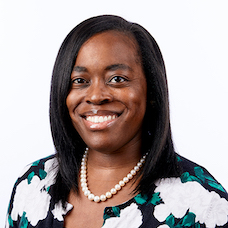As a former Public Health Post Fellow, Madeline Bishop (SPH’18) says one of most valuable skills she gained from the year-long program was the ability to impart complex health information to broad audiences using clear and engaging language, rather than public health jargon. This skill has become especially useful to her as a communication information specialist for Health & Wellness at The University of New Hampshire (UNH), where she writes about UNH health news and programming. She also used her PHP training to help develop the university’s Covid-19 public health campaign ahead of its massive testing program debut earlier this fall.
“In public health, it’s easy to lean on buzz words such as ‘social determinants of health’ and ‘marginalized communities,’ but if we can’t break down big ideas for people who aren’t in the field, it becomes a lot more difficult to make a point that will stick,” says Bishop, who was part of the 2017 cohort of fellows. During her time at PHP, she wrote articles on a range of topics, from an interview on conscious consumerism with Deborah Dugan, CEO of (RED), to a personal reflection on self-care and compassion among public health professionals. “Avoiding public health jargon is something I always keep in mind as I translate ideas and information now, especially to college students,” she says.
At a time when communicating the work of public health is more important than ever, Public Health Post alums continue to advance public health research, broaden the public health conversation, and inform policies that improve health and promote social justice. Since the program debuted in 2016, current and past fellows have published nearly 600 articles as in-depth research, concise databytes, thought-provoking viewpoints, powerful profiles, and newsworthy content.
“One of my greatest pleasures at SPH has been the chance to work with 17 talented and thoughtful PHP fellows, who have brought forward an endless stream of articles and ideas to enlarge my understanding of public health, and I expect, our readers,” says Michael Stein, executive editor of PHP and chair of the Department of Health Law, Policy & Management.
In a year where so many health issues intertwine and dominate public conversation, “it is particularly important for public health research and information to be digestible so that the public can feel empowered to take care of themselves and their communities from a healthcare perspective,” says Sampada Nandyala (SPH’19). She was a 2018 PHP fellow who completed the MPH program at the School of Public Health with a focus on epidemiology and biostatistics, and infectious diseases.
“I learned to examine public health studies and publications with a more critical eye, looking out for key takeaways that will translate to a non-academic audience,” says Nandyala.
This skill is critical in her current role as a senior research assistant at Harvard Pilgrim Health Care Institute (HPHC), where she conducts data reviews and supports project documentation and communication for HPHC’s Sentinel Operations Center. “I’m able to strike a balance between being detail-oriented and understanding the big picture goal of a project or task,” she says.
Nandyala says she particularly enjoyed writing profiles, which enabled her to apply public health concepts through the work of experts in the field. “My favorite profile, and possibly my favorite piece, is one that I wrote on Ayesha Barenblat,” she says of the founder and CEO of Remake, a platform that promotes ethical fashion. “This piece was a passion project of mine that combined two of my top interests: public health and fashion.”
“Public health is for and about the people, and it is really important to me to make sure that novel research is accessible beyond published academic papers and conference presentations,”
As an inaugural PHP fellow from May 2016-February 2017, Maggie Thomas (SSW’20) says the interdisciplinary nature of the program was valuable then and now. She completed the fellowship while pursuing her PhD at BU’s School of Social Work, where she graduated last May. Now a postdoctoral research scientist at Columbia University School of Social Work, Thomas says the variety of public health topics that she wrote about helped shape the way she presents her current research for the Columbia Population Research Center, focusing on the economic wellbeing of children and racial disparities of youth in Child Protective Services.
“From research stories to databytes, being able to produce so many types of communications really expanded my skill set and helped me think about what research communication could look like,” says Thomas. She will begin teaching about poverty and social welfare policy next summer as an assistant professor in the Department of Social Welfare at UCLA Luskin School of Public Affairs.
Thomas says she also appreciated learning about topics outside of her discipline—such as the individual and community health benefits of public art—as well as how to present social science data to people outside of the field of social work. “Each fellow in my cohort had a different educational background, so having conversations with each other helped us recognize the assumptions that we bring to our own research, and be able to explain concepts to people unfamiliar with our expertise.”
Jori Fortson (SPH’20), a May 2020 SPH graduate who was part of the fourth cohort of fellows in 2019, says she applied for the program to make public health research “accessible to the everyday person.”
“Public health is for and about the people, and it is really important to me to make sure that novel research is accessible beyond published academic papers and conference presentations,” says Fortson, who is currently an Atlanta-based part-time research associate for the International Center for Research on Women, where she conducts data analysis on the increase of gender-based violence in the era of COVID-19. “What really drew me to the program was the opportunity to make impactful research both interesting and digestible, and not only to policymakers and journalists, but to anyone who comes across PHP outside of the public health sector.”
At SPH, she studied Community Assessment, Program Design, Implementation, and Evaluation (CAPDIE) and maternal and child health, and some of the PHP articles she most enjoyed writing include a viewpoint on breastfeeding, as well as research articles on the hypersexualization of Black girls, and redlining and health in Detroit, MI.
“One of the reasons why I am in this field is to work towards achieving healthy equity and optimizing the health of populations that have been decentralized, and I appreciated being able to name racism and racial inequities in health in my research articles,” Fortson says.
Greg Kantor (SPH’20), also a May 2020 SPH graduate and PHP fellow in the fourth cohort, entered the program with prior journalism experience as the editor-in-chief of his undergraduate newspaper at Muhlenberg College, where he majored in public health. He says PHP was the perfect opportunity to unite his academic understanding of public health with his extracurricular experience in journalism.
“But what’s great about PHP is that fellows don’t necessarily need that prior experience,” says Kantor, who is now a communications associate for The Health Management Academy. “Everyone has skills and experiences that can be applicable to the fellowship and will enable them to mold it into an opportunity that is most helpful to their professional goals.” He says he feels comfortable writing about any of the 30 topics he explored, from safe drinking water in schools to a profile of Nils Melzer, a human rights lawyer and the United Nations’ top expert on war crimes.
PHP fellows also attend weekly pitch meetings to discuss their research topics, and weekly writing workshops to practice different writing styles and techniques, develop strategies for editing their work, and provide feedback to other fellows’ work. Kantor says the workshops challenged him “to not accept a first draft as the be-all-and-end-all of writing.
“I’m a perfectionist, so to know that each of my articles was going to go through four revisions was really hard for me at the beginning of the fellowship,” he says. “But throughout the year, I became much more receptive to feedback. The workshops really enabled us to think critically about our own work, and appreciate and learn from each other’s writing.”
Jennifer Beard, associate editor of PHP and clinical associate professor of global health, says this growth is precisely the aim of the writing workshops.
“My goal in working with each fellow is to help them see and hear the ways in they can improve their articles,” says Beard. “Developing an ear for how their writing sounds is a great first step toward developing their voice and style.”
For graduate students who are interested in PHP, Bishop offers sage advice: Learn as much as possible from the fellowship, and enjoy the experience.
“Sometimes certain data and research can tend to seem dry,” she says. “But if you have can fun with each piece and inject an element of storytelling into your writing, readers will enjoy it more and you will make a much stronger impact through your work.”
Photo via Getty Images














